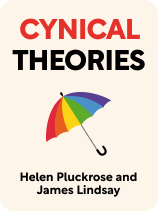

This article is an excerpt from the Shortform book guide to "Cynical Theories" by Helen Pluckrose and James Lindsay. Shortform has the world's best summaries and analyses of books you should be reading.
Like this article? Sign up for a free trial here.
What’s postmodernism? What’s deconstruction? What’s the difference between cultural hierarchy and class hierarchy?
In Cynical Theories, Helen Pluckrose and James Lindsay show how, over time, social justice went from a positive force to its current form. The first phase featured liberals and Marxists taking a material approach. In the second phase, postmodernism, the focus shifted to culture.
Read more to learn about the tenets of postmodernism and how it shaped social justice.
Tenets of Postmodernism
Pluckrose and Lindsay explain that, beginning in the 1950s, a new understanding of social justice began to emerge: postmodernism, an intellectual and artistic movement focused on challenging existing understandings of the world. Postmodernists focus not on concrete material issues (as liberals and Marxists had) but instead on how power is expressed through culture.
Though postmodernism can prove difficult to define, Pluckrose and Lindsay identify two main tenets of postmodernism.
(Shortform note: To better understand what postmodernism is, we can look at what it rejects: modernism. Modernism was an artistic movement popular in the 19th and early 20th centuries, and it tried to make sense of the massive changes caused by industrialization. The modernist movement believed society could make progress and improve over time by embracing technological innovation and rejecting old, “outdated” traditions. In addition, modernists tried to define the meaning of life and morality without relying on religion or strict reason and logic. Postmodernists, on the other hand, argue this cannot be done and that society does not in fact “progress” toward anything.)
Tenet #1: Deconstruct All Truths
Postmodernism, the authors explain, rejects the idea of objective truth. According to postmodernist thought, anything considered to be objective truth is in fact a biased narrative, or, view of the world created by a specific culture. These narratives often exist to the benefit of people in power since those with the most power have the most control over the shaping and creation of culture. Postmodern scholarship attempts to discover power dynamics behind claims to objective truth and then deconstruct those claims by pointing out their biases and inconsistencies.
This is the foundation of postmodernism’s critique of liberalism and Marxism. Both philosophies believe people can uncover objective truths about the world—liberals through rational thought and Marxists through analyzing class conflict. Postmodernists argue these are both metanarratives, or, biased cultural lenses people use to create other narratives about the world.
| Deconstruction in Action: Madness and Civilization To see how deconstruction works in reality, we can look to foundational postmodernist philosopher Michel Foucault and his work Madness and Civilization. In it, Foucault deconstructs the categories of “mentally healthy” and “mentally ill.” He claims these categories are part of a narrative created by those in power (doctors and psychiatrists in this case) rather than objective truths about people. These categories allow those in power to justify their biases about who is an acceptable member of society—and give them a justification to control those deemed unacceptable by limiting their rights or imprisoning them in mental hospitals. To deconstruct this narrative, Foucault discusses how society’s conception of mental illness changed over time as a result of social forces and how these changes served those in power. In medieval Europe, he says, the “mad” were respected for their unique perspective and insights about the world—insights far more compatible with the era’s religiosity. However, the Enlightenment emphasized a worldview based on perception and empirical evidence rather than religious belief. Under this new dominant narrative, the unique perception and insights of the mad were not a boon but instead a challenge or threat to those in power. Therefore, the mad went from being respected to persecuted. |
Tenet #2: Challenge Cultural Hierarchies
Postmodernists believe hierarchies of power exist within every social class as well as between them—people reinforce narratives through social interactions and conversations, often without realizing it. This occurs even on the level of specific language and word choices as people talking to one another imply hierarchies or echo oppressive narratives created by those in power. Because these hierarchies are everywhere at once and constantly being reinforced, postmodernists didn’t have an answer to how they could be addressed or how society could be improved. Therefore, unlike the Social Justice Movement, early postmodernists stuck to academic analysis as opposed to activism.
For example, early postmodernist Roland Barthes’s work Mythologies provides an in-depth analysis of how dominant groups create certain associations or myths that the population at large then repeats and passes on to one another. Advertising does this all the time—Jeep ads associate the vehicle with outdoor adventure and exploration, Gatorade with athleticism and competition, and so on. But while Mythologies shows how myths work and how they can perpetuate social inequality, Barthes doesn’t offer much in the way of concrete advice to address them beyond simply noticing they exist.
(Shortform note: Marxist critics of postmodernism argue it focuses on cultural hierarchy as opposed to class hierarchy because it is inspired far more by middle-class discontent than by the plight of the poor, working-class people. According to these critics, postmodern academics who were securely middle class viewed culture as the main issue threatening equality because they weren’t involved with labor movements fighting for economic equality—labor movements characteristic of previous left-wing scholarship and activism.)

———End of Preview———
Like what you just read? Read the rest of the world's best book summary and analysis of Helen Pluckrose and James Lindsay's "Cynical Theories" at Shortform.
Here's what you'll find in our full Cynical Theories summary:
- How and why modern advocacy has gone too far
- How social justice scholarship and activism has become dangerous
- Why freedom of speech and belief in science are more important than ever






